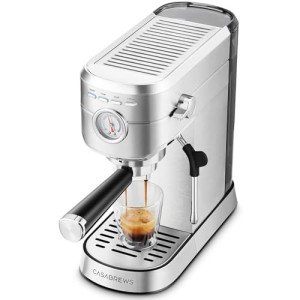Home Use Espresso Machines: A Comprehensive Guide
Espresso machines have actually ended up being a staple in numerous households as coffee enthusiasts look for to duplicate café-quality brews in the convenience of their kitchen areas. The increase in popularity has actually resulted in a diverse market filled with different models, functions, and rates. This post aims to supply a useful summary of home use espresso machines, assisting readers navigate their options successfully.
Comprehending Espresso Machines
Espresso machines work by requiring hot water through finely-ground coffee under high pressure, leading to a concentrated coffee drink called espresso. There are numerous kinds of espresso machines classified based upon their developing approaches and level of automation. The most common types include:
- Manual Espresso Machines: These need the user to manage the pressure and water flow, permitting a more hands-on coffee-making experience.
- Semi-Automatic Espresso Machines: These offer automatic control over water pressure, while the user manually grinds and tamps the coffee.
- Automatic Espresso Machines: With the push of a button, these machines automatically manage the flow of water, making it much easier to brew espresso with consistent results.
- Super-Automatic Espresso Machines: These all-in-one machines handle grinding, tampering, brewing, and even milk frothing, making them ideal for users searching for convenience.
- Capsule or Pod Machines: These use pre-packaged coffee pods to develop espresso with minimal effort, but they restrict option in brewing techniques and tastes.
Table: Comparison of Espresso Machine Types
| Type | Control Level | Reduce of Use | Cleaning Level | Perfect For |
|---|---|---|---|---|
| Manual | User-controlled | Moderate | High | Coffee perfectionists |
| Semi-Automatic | Partial automation | Moderate | Moderate | Home baristas |
| Automatic | Completely automated | Easy | Low | Hectic people |
| Super-Automatic | Completely automated | Extremely simple | Extremely low | Convenience hunters |
| Capsule/Pod | Totally automated | Extremely easy | Very low | Casual drinkers |
Secret Features to Consider
When choosing a home use espresso machine, it's necessary to think about different functions that can substantially impact the quality of espresso and user experience.
- Pressure: Look for machines that supply a minimum of 9 bars of pressure, as this is considered ideal for brewing espresso.
- Boiler Systems: Single vs. dual boiler systems figure out temperature level stability and the capability to brew espresso and steam milk concurrently.
- Grinder: Integrated mills enable freshly ground coffee, which boosts flavor. Think about machines with adjustable grind settings.
- Milk Frother: For those who take pleasure in coffees and lattes, a built-in steam wand or automatic frother is crucial.
- Size and Design: Consider your cooking area space and aesthetic preferences. Office Espresso Machines are available in various sizes, from compact to large setups.
- Cost: Home espresso machines can range from a few hundred to several thousand dollars, so it's vital to establish a budget before checking out options.
Benefits and drawbacks of Home Use Espresso Machines
| Pros | Cons |
|---|---|
| Convenience of brewing coffee in your home | Initial financial investment can be high |
| Quality of espresso is frequently superior | Needs some skill, especially with manual machines |
| Capability to try out flavors | Upkeep and cleaning can be labor-intensive |
| Can conserve cash in the long run | Not all machines will match every coffee preference |
Upkeep and Cleaning Tips
Keeping an espresso machine is crucial for lengthening its life and guaranteeing constant brew quality. Here are some useful tips:
- Regular Descaling: Minerals from water can develop up in the machine. Descale every 1-3 months, depending on water solidity.
- Daily Cleaning: Rinse portafilters, baskets, and steam wands after each use to prevent coffee oils from constructing residue.
- Use Filtered Water: This can assist reduce mineral buildup and improve the taste of coffee.
- Replace Gaskets and Seals: These parts might break gradually and must be changed to preserve pressure and performance.
- Read the Manual: Each machine has specific care directions; following these will ensure longevity.
Frequently Asked Questions About Home Use Espresso Machines
Q1: What is the very best budget espresso machine?The best budget espresso machine often depends upon specific requirements, but models like the DeLonghi EC155 or the Breville Bambino are popular amongst users for offering great worth. Q2: How long do home espresso machines normally last?With correct upkeep, home espresso machines can last anywhere from 5 to 15 years, depending on the quality of the machine and frequency of use. Q3: Can I make cappuccinos and lattes with any espresso machine?While most espresso machines can make coffees and lattes, having a reliable
steam wand or frother is important for attaining the best milk texture.
Q4: Are super-automatic machines worth the investment?For those who prioritize benefit and quick developing, super-automatic machines can be worth the investment, though they may lack some customizability in brew strength and taste. Q5: What kinds of coffee beans are best for espresso?While individual choice contributes, beans labeled as" espresso "blends are usually roasted darker, creating rich tastes and a velvety texture when brewed.
Buying a home espresso machine can transform the daily coffee regimen into something special, elevating home brews to café quality. By understanding the various kinds of machines, essential features to think about, maintenance needs, and weighing the
advantages and disadvantages, customers can make educated decisions that fit their specific preferences. As the espresso culture continues to grow, no matter the option, every brew can be a scrumptious experience waiting to be relished.

